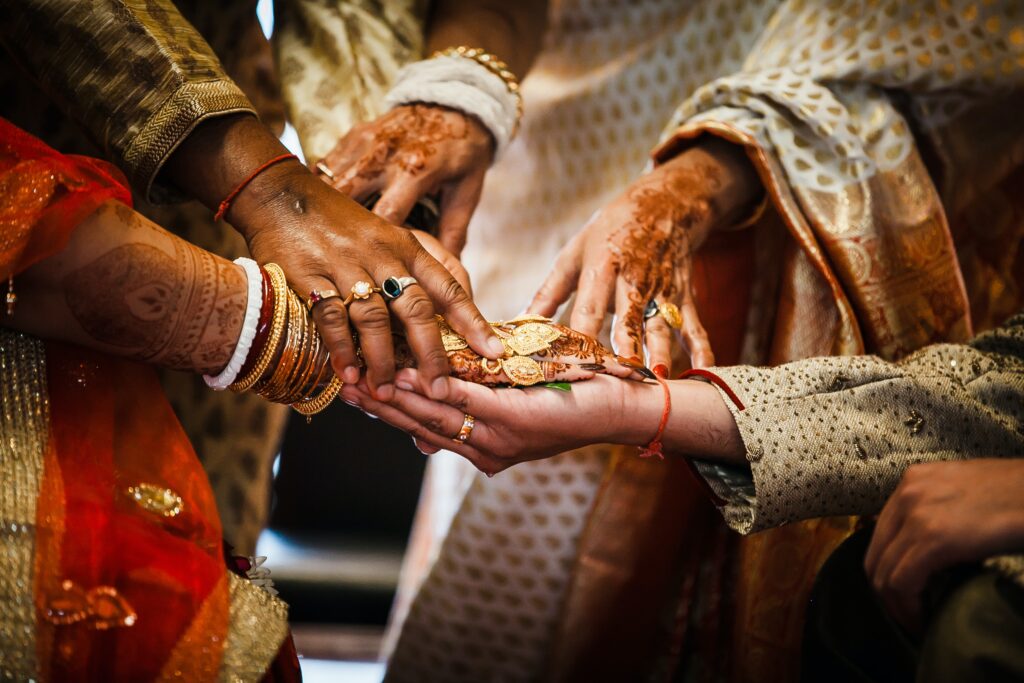No one is quite sure how it started, but there seems to be a belief that if you live with someone long enough, cook for them, share bills and generally behave as if you are married, then you are in fact married. This is called common law marriage. And while it may seem like a reasonable assumption, the truth is that living together does not automatically make you husband and wife. In order to have a valid common law marriage in Indiana, you must meet several specific criteria. So before you go rushing off to the courthouse with your loved one, be sure to read on and find out if common law marriage is right for you.
Do you live in Indiana? Are you and your partner thinking of getting married? If so, it’s important to know about common law marriage. Contrary to popular belief, simply living together does not automatically make a couple married – they must meet certain criteria first. Keep reading to learn more about this unique type of marriage and whether or not it’s right for you!
Contents
- 1 What is common law marriage and how does it work in Indiana?
- 2 What are the benefits of having a common law marriage in Indiana?
- 3 How do you go about getting a common law marriage in Indiana?
- 4 What are the consequences of not having a common law marriage in Indiana?
- 5 Common law marriage myths busted
- 6 Are there any other special considerations for common law marriages in Indiana?
- 7 Conlcusion: Common law marriage indiana
- 8 FAQ: Common law marriage indiana
- 8.1 Can common law marriages be annulled in Indiana?
- 8.2 Do couples in common law marriages have the same rights and responsibilities as married couples?
- 8.3 Which States Recognize Common Law Marriage?
- 8.4 What is required to form a valid common law marriage in Indiana?
- 8.5 What is the process for obtaining an annulment of a common law marriage?
- 8.6 Does a common law marriage require certificate?
- 8.7 How do you prove you are common law partner?
- 8.8 How long do you have to be with your partner to be common-law?
- 8.9 What is a common-law wife entitled to?
- 8.10 Can you collect Social Security from a common-law spouse?
- 8.11 What is the disadvantage of common-law marriage?
What is common law marriage and how does it work in Indiana?
Common law marriage is a type of marriage where two people are considered legally married without having gone through any formal ceremony or filing paperwork with the government. It typically requires both parties to agree that they are in fact married, live together for an extended period of time and share financial responsibilities such as bills and living expenses. In Indiana, it’s important to note that common law marriage is not recognized unless certain criteria are met.
First, both parties must agree to be married and hold themselves out as husband and wife in the eyes of the public. This means that they must live together, share a last name and generally behave as though they are married even without a legal document or ceremony. Second, they must have lived together for an extended period of time, typically five years or more. Finally, both parties must also be at least 18 years of age and mentally competent to enter into a marriage contract.

It’s important to keep in mind that if any one of these criteria are not met, then the couple is not considered married under Indiana law. While it is possible to get common law married in other states, it’s important to know that these rules will differ from state to state.
Common law marriage can be a great option for couples who want the benefits of being married without having to navigate through the complications of a traditional ceremony and legal paperwork. However, it’s important to remember that there are certain criteria that must be met in order for it to be recognized. Be sure to check with a lawyer or legal expert if you have any questions about common law marriage in Indiana.
By understanding what common law marriage is and how it works, couples can make an informed decision about whether or not this is the right option for them. With the right knowledge and preparation, common law marriage can be a great way to enter into a lifelong commitment with your partner.
What are the benefits of having a common law marriage in Indiana?
Common law marriage has many benefits for couples who are looking to enter into a more permanent relationship without having to go through the legal process of a traditional marriage.
For one, common law marriage is far less expensive than traditional marriages since couples don’t have to pay for things like wedding ceremonies or filing fees with the government. In addition, couples who are already living together and sharing common expenses may not need to make any major changes since they’ll already be doing many of the same things married couples do.
Common law marriage also gives partners more control over their relationship since there is no legal paperwork that must be filed or any requirements for how the couple should act. This can be beneficial for couples who want to keep their relationship more private or would like to have a more flexible arrangement.

Finally, common law marriage can provide some of the same legal rights and benefits as traditional marriages, such as the ability to make medical decisions for each other and the automatic transfer of assets in the event of death.
It’s important to note, however, that common law marriage is not recognized in all states, so it’s important to familiarize yourself with the laws in your particular state. Couples who are considering entering into a common law marriage should also speak with an attorney to make sure they understand their rights and responsibilities before making any lasting decisions.
In conclusion, common law marriage can be an excellent option for couples who are looking to solidify their relationship without going through the legal process of a traditional marriage. By understanding its benefits and knowing the criteria that must be met in order to have a legally binding common law marriage, couples can make an informed decision about whether or not this is the right choice for them.
How do you go about getting a common law marriage in Indiana?
In Indiana, couples must meet certain criteria in order to enter into a legally binding common law marriage. The first and most important requirement is that the couple must have agreed to be married and “held themselves out” as married for a period of time, typically five years or more. Both parties must also be at least 18 years of age, of sound mind, and legally capable of consenting to the marriage.
In addition, Indiana requires that the couple must live together in the same state or perform certain marital acts such as filing joint tax returns or referring to each other as “husband” and “wife” in public settings. Any evidence of these actions can be used to prove the existence of a common law marriage.
Once all of these criteria have been met, couples in Indiana who wish to enter into a common law marriage must obtain an affidavit from at least two witnesses attesting that the couple has agreed to be married and lived together as if they were married. The affidavit must then be signed by both members of the couple and submitted to the local county court. The court will then issue a common law marriage license, which is valid for one year.
After obtaining their license, couples must return to the county court after one year to renew it if they wish to keep their common law marriage intact. It’s also important to note that common law marriages are not legally recognized in all states, so couples should check with the laws of their state before proceeding.

In conclusion, couples in Indiana who wish to enter into a common law marriage must meet certain criteria and obtain an affidavit from at least two witnesses attesting to the couple’s agreement to be married and living together as if they were married. Once the affidavit is signed and submitted to the county court, couples can obtain a common law marriage license which must be renewed each year in order to keep their relationship legally binding. Couples should check with their state’s laws to ensure that common law marriages are legally recognized before proceeding.
Overall, common law marriage can be an excellent option for couples who are looking to solidify their relationship without going through the legal process of a traditional marriage. By understanding its benefits and knowing the criteria that must be met in order to have a legally binding common law marriage, couples can make an informed decision about whether or not this is the right choice for them. With the proper knowledge and understanding, couples in Indiana can take advantage of this unique relationship option.
What are the consequences of not having a common law marriage in Indiana?
In Indiana, couples who are not legally married are typically considered unmarried cohabitants. This means that they do not have the same rights as married couples in areas such as property division, spousal support, or estate planning. It also means that if one partner passes away, the other does not automatically inherit any of their property or assets and might not even have a right to make decisions about the deceased partner’s funeral or estate.
Additionally, couples who are not legally married may find that they have difficulty obtaining certain benefits such as health insurance, Social Security survivors’ benefits, or veterans’ benefits. Couples should be aware that in some cases, these benefits may be available to unmarried cohabitants, but it depends on the particular situation.
Finally, couples who are not legally married may encounter legal issues when attempting to file a joint tax return or make medical decisions on behalf of their partner. Therefore, it is important for those in Indiana who are considering entering into a common law marriage to understand the potential consequences of not having a legally binding marriage.

In summary, couples in Indiana should carefully consider the consequences of not having a common law marriage before entering into this type of relationship. Although it can be an excellent option for some couples, it is important to understand that without a legally binding marriage, certain rights and benefits may not be available. Therefore, couples should research their state’s laws and consider the potential consequences before making a decision. Additionally, couples should also seek professional legal advice if they have any questions or concerns about entering into a common law marriage in Indiana. By doing so, they can make an informed decision that is right for them.
Common law marriage myths busted
When it comes to common law marriage, there are several myths that have been circulating for years. Here is a look at some of the most common myths and the truth behind them:
Myth: Common Law Marriage Is Recognized Everywhere – False. Common law marriage is only recognized in certain states, usually those with a long history of common law marriage.
Myth: Common Law Marriage Is Automatically Recognized After Seven Years – False. Even if a couple has been living together for seven years, they must still meet the criteria for a common law marriage in order to be recognized as legally married.
Myth: Living Together Automatically Makes You Legally Married – False. Merely living together does not make a couple legally married and the other criteria for common law marriage must be met in order for it to be legally recognized.
Myth: Common Law Marriage Gives You All of the Same Rights as Traditional Marriage – False. Common law marriage does not always give you all of the same rights as a traditional marriage. Couples should research their state’s laws to find out what rights they may or may not have under a common law marriage.
By understanding the facts about common law marriage in Indiana, couples can make an informed decision about whether or not this is the right option for them. Whether you are considering entering into a common law marriage or are already in one, it is important to understand the potential consequences and be aware of your rights so that you can protect yourself.
If you have any questions or concerns about common law marriage in Indiana, it is best to contact a qualified family law attorney for advice and assistance. An experienced lawyer can help you understand the laws and legal requirements and ensure that your rights are protected.
By understanding the facts about common law marriage in Indiana, couples can make an informed decision about whether or not this is the right option for them. They should also be aware of their legal rights and responsibilities, especially when it comes to matters such as obtaining benefits upon the death of a partner or filing taxes together. Additionally, couples should seek professional legal advice if they have any questions or concerns about entering into a common law marriage in Indiana. With the right information and preparation, couples can make the best decision for their unique situation.
Are there any other special considerations for common law marriages in Indiana?
Yes, there are a few additional considerations for common law marriages in Indiana. For instance, couples must declare their marriage status in order to be considered legally married and receive benefits from the state. Additionally, if one partner dies without leaving a valid will, it can create complications with distributing assets and determining inheritance rights. Couples in common law marriages should also be aware of the Indiana state laws regarding child custody, visitations, and support. Finally, they should always keep accurate records of all legal documents such as marriage certificates and tax returns in order to protect their rights.
These are just a few of the special considerations for common law marriages in Indiana. Couples should do their research and consult with a qualified family law attorney to ensure that their rights are fully understood and protected. With the right knowledge and preparation, couples can make the best decisions for their situation.

Conlcusion: Common law marriage indiana
Is a legal relationship that has been recognised for many years, but couples should still be aware of the myth and unique considerations that come with it. Knowing their rights and responsibilities is key to ensuring that their union is respected and protected by the law. Couples should always seek professional legal advice when considering entering into a common law marriage in Indiana. With the right knowledge and preparation, couples can make the best decisions for their situation.
FAQ: Common law marriage indiana
Can common law marriages be annulled in Indiana?
Yes, common law marriages can be annulled in Indiana. However, the process can be more complicated than for a traditional marriage. An annulment is a legal procedure that cancels or voids a marriage, making it as though the marriage never existed in the first place. In order to obtain an annulment of your common law marriage, one partner must prove that the union was invalid, or that it violated certain legal parameters. Couples should seek the advice of a qualified family law attorney to discuss their options and understand the process for annulling their marriage. Annulment cases require particular knowledge of Indiana state law, so it is important to contact an experienced lawyer who can help protect your rights.
Do couples in common law marriages have the same rights and responsibilities as married couples?
In many cases, yes. Since common law marriage is legally recognized in Indiana, couples in a valid common law union are considered legally married and have the same rights and responsibilities as other married couples. This includes inheritance rights upon the death of a partner, filing taxes jointly, and child custody and support matters. As such, it is important that couples in a common law marriage understand their rights and responsibilities under the law to ensure that their union is respected and protected. Couples should also seek the advice of a qualified family law attorney if they have any questions or concerns about their rights.
Which States Recognize Common Law Marriage?
Currently, only 11 states recognize common law marriage: Alabama, Colorado, Iowa, Kansas, Montana, Rhode Island, South Carolina, Texas, Utah, and New Hampshire. Additionally the District of Columbia recognizes common law marriage. It is important to note that states have different requirements for what constitutes a legally recognized common law relationship – some may allow couples to simply agree to be married, while others require the couple to live together for a certain period of time before their relationship is legally recognized. Therefore, it is important that couples consult with an experienced family law attorney who can advise them on their state’s laws and ensure that they are in compliance. Couples should also take into account other states’ laws and regulations if they plan to travel or move. Couples should be aware of the different requirements for common law marriages in each state before making any decisions about their relationship status.
What is required to form a valid common law marriage in Indiana?
In order to have a legally recognized common law marriage in Indiana, couples must meet the following requirements: (1) both parties must be of legal age, which is 18 in Indiana; (2) both parties must have the capacity to enter into a marital relationship; (3) both parties must agree to be married; and (4) they must live together as husband and wife. It is important to note that simply living together is not enough – couples must also demonstrate that they are in a committed relationship and intend to stay married. This can be demonstrated by engaging in behaviors such as filing joint taxes, owning joint property, or referring to each other as “husband” and “wife”. Couples should consult with an experienced family law attorney who can provide further guidance on forming a valid common law marriage in Indiana.
What is the process for obtaining an annulment of a common law marriage?
In order to obtain an annulment of your common law marriage, one partner must prove that the union was invalid, or that it violated certain legal parameters. Annulments typically require particular knowledge of family law, so it is important to consult with an experienced family law attorney who can help protect your rights. Depending on the circumstances of your relationship and the state in which you reside, annulment proceedings may vary slightly. However, some common grounds for annulment include fraud or misrepresentation (one partner lied about something essential), underaged marriage, coercion (one partner was forced into the marriage), or impotency. Annulments are generally more complex and time-consuming than divorces, so it is important to seek professional legal advice before taking any action.
Does a common law marriage require certificate?
Common law marriages can be a lot like real-lifeenos. They’re not officially recognized by the government, but if you live in certain states and meet some criteria then your marriage will have all of its benefits intact!
How do you prove you are common law partner?
The best way to show that you’re in a common law relationship is by sharing property ownership and leases. You could also share utility bills, important documents with your partner showing the same address, or identification cards.”
Additionally, living together and holding yourselves out as a married couple is another way to prove that you are in a common law marriage. Ultimately, it’s up to the state court or family court to decide whether or not your relationship qualifies as a valid common law marriage. Therefore, it is important to consult with an experienced family law attorney who can help ensure that your rights and interests are protected.
How long do you have to be with your partner to be common-law?
In order for a common law marriage to be valid, couples must meet certain requirements. These requirements vary from state to state, but typically include both parties being of legal age and consenting to the union, living together for a certain period of time in an exclusive relationship, and presenting themselves as husband and wife to their community. The exact length of time required to form a valid common law marriage can also vary, but generally ranges from 6 months to 1 year. It is important to note that simply living together is not enough – couples must also demonstrate that they are in a committed relationship and intend to stay married. Couples should consult with an experienced family law attorney who can provide further guidance on forming a valid common law marriage.
What is a common-law wife entitled to?
Without being married or in a civil partnership, people who live together have few legal rights when it comes to finances and property. There is no such thing as “common law marriage”
The above passage discusses how living together without any form of recognition can result in many implications for your personal life–rural vs urban areas; single status versus coupled up couple’s situation…
Can you collect Social Security from a common-law spouse?
The short answer is no, you cannot get spousal or survivor benefits if your relationship was never legally married.
The most important thing for people to know about this issue are the different types of marriage recognized by each state–there’s “common-law” marriage which does not require any legal paperwork but doesn’t offer similar protections as traditional ceremonies do either!
What is the disadvantage of common-law marriage?
The main disadvantage of common law marriages is that even when your relationship meets the requirements listed above, there will still be no presumption that a marriage existed so you’re marital rights won’t always carry over from one state to another.
Scott A. Bentley Attorney at Law in McHenry, IL is a debt relief and personal injury attorney dedicated to helping people in their time of need. He can assist in filing bankruptcy under the bankruptcy code or work with you through a personal injury case. His more than 25 years of experience provide him with the insight and knowledge you need when contending with difficult legal issues. Scott Bentley bankruptcy services stop: Creditor harassment, Lawsuits, Garnishments, Foreclosures, Repossessions, By filing for chapter 7 or 13 bankruptcy with Scott Bentley, you’ll also be able to create personal reorganization plans that serve to resolve individual bankruptcy issues. He and his staff are committed to providing you with dignified service and the respect you deserve. Just because you owe someone or some company money doesn’t mean you forfeit your rights. With Mr. Bentley you can be sure you will receive personalized attention and aggressive legal representation. The firm is proud to

